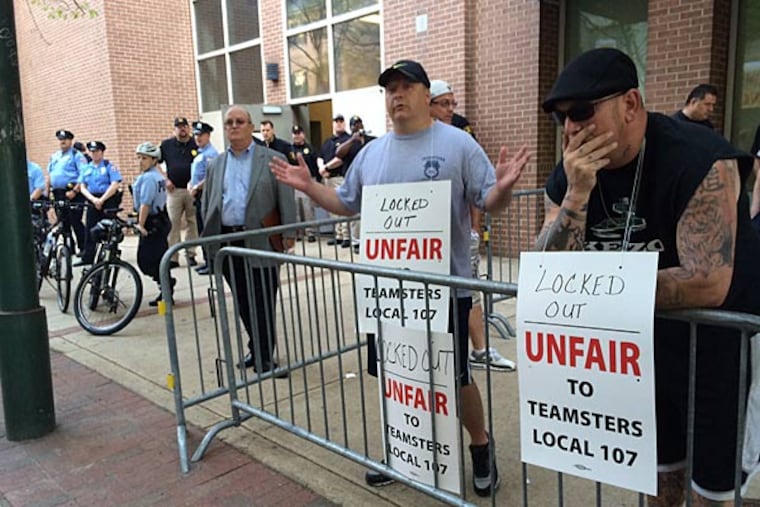Union workers protest 'lock-out' at Convention Center
Workers returned to the job at the Pennsylvania Convention Center Monday morning as members of two fellow unions protested against being shut out from the sprawling complex.

Workers returned to the job at the Pennsylvania Convention Center Monday morning as members of two fellow unions protested against being shut out from the sprawling complex.
Police outnumbered the union protesters.
During the morning, about 40 to 50 demonstrators - most, if not all, from Teamsters Local 107 - held positions around the sprawling complex, carrying signs saying "Locked Out" and shouting at workers entering the building. Some members of Carpenters Union Local 8 handed out literature to passersby.
Four other unions reached agreement on work rule changes at the center last week and their members continue to work at the center.
As protesters jeered, electricians Local 98 leader John Dougherty, Sam Staten of Laborers Local 332 and Michael Barnes of the Stagehands union joined about 30 members of their unions going into the hall to begin work on exhibits for a conference being held there this week.
Police, including uniformed bicycle officers and members of the Civil Affairs Unit in plainclothes, took up positions on every block around the center.
"Is al-Qaeda supposed to launch a terrorist attack here?" said a Teamster who would not give his name. "It seems like a hell of a lot of people for a labor dispute."
Police Capt. Stephen Glenn of the Civil Affairs Union said the protesters have been "very well behaved and professional."
A black tractor tailer with Teamsters Local 107 on the side announced the union's presence in a highly visible fashion.
"Go home," a group of Teamsters shouted as two men carrying doughnuts walked into the center's employee entrance.
The protest coincides with the start of registration for the 11th annual World Congress on Industrial Biotechnology at the Convention Center. About 1,100 people are expected to attend the convention, which runs through Thursday.
Carpenters Local 8 staged a one-day strike May. After the Carpenters returned to work, they and the Teamsters failed to meet a deadline set by the center to accept new work rules and lost their convention jobs to other unions.
On Sunday, John McNichol, the Convention Center's chief executive officer, said he expected any protests Monday to be civil.
McNichol said reforming the work rules would eventually help repair the Convention Center's reputation and make it a more appealing destination for major gatherings.
"People come here, and they love our city, they love our restaurants, they love our walkable streets," McNichol said. "The problem is the cost and the hassle."
He said unions were not to blame for all the complaints at center, citing management problems last year, too. But taking on labor costs sends a message that the Convention Center is prepared to evolve in order to attract more business, he said.
Representatives of the Carpenters and Teamsters did not return calls for comment Sunday. Earlier, the Carpenters issued a statement that said: "The Carpenters will do what is necessary to right this wrong and stand up for their members."
The two locals belatedly agreed to the new work rules on Friday, but Convention Center management rebuffed them. Officials said the unions missed a May 5 deadline to accept the changes and said they would not revisit the issue.
The unions contend they were misled about the deadline, which center management said was not so.
As a result, the Carpenters' and Teamsters' work will be divided among the unions that agreed to the new rules - Laborers Local 332, Electrical Workers Local 98, Stagehands Local 8, and Iron Workers 405.
The center, which completed a $780 million expansion in 2011, has not met its financial expectations. The expansion was supposed to help it draw up to 30 major conventions a year, but fewer than half that have been scheduled per year through 2017.
Among the new rules is one that will allow exhibitors to set up booths (up to 600 square feet, double the present limit) with their own full-time employees instead of the center's union workers. Another rule institutes a standard drug-testing program for union workers.
Staff writer Joseph N. DiStefano contributed to this article.